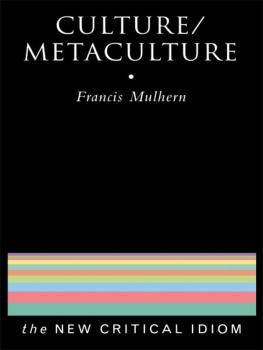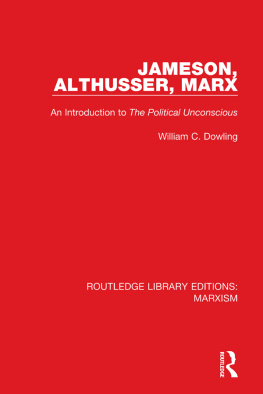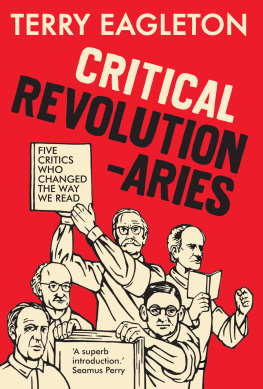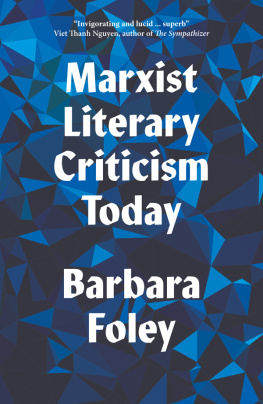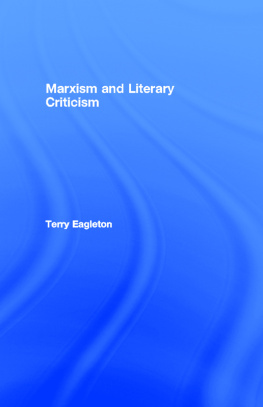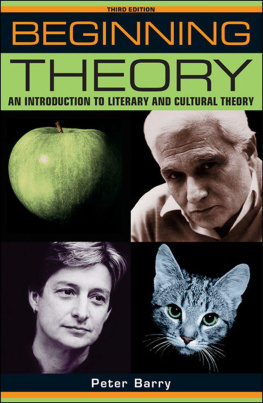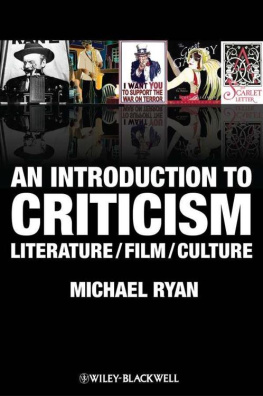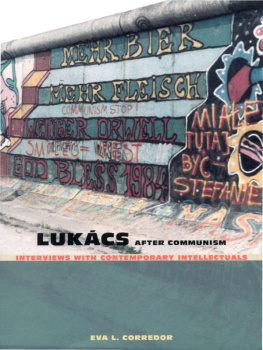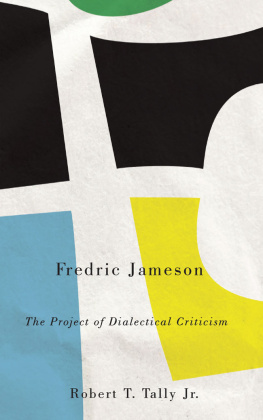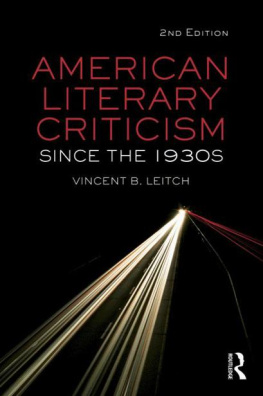C ONTEMPORARY M ARXIST L ITERARY C RITICISM
L ONGMAN C RITICAL R EADERS
General Editors:
R AMAN S ELDEN , late Emeritus Professor of English, Lancaster University and Professor of English, Sunderland Polytechnic;
S TAN S MITH , Professor of English, University of Dundee
Published titles:
K. M. N EWTON , George Eliot
M ARY E AGLETON , Feminist Literary Criticism
G ARY W ALLER , Shakespeares Comedies
J OHN D RAKAKIS , Shakespearean Tragedy
R ICHARD W ILSON AND R ICHARD D UTTON , New Historicism and Renaissance Drama
P ETER W IDDOWSON , D. H. Lawrence
P ETER B ROOKER , Modernism/Postmodernism
R ACHEL B OWLBY , Virginia Woolf
A NNABEL PATTERSON , John Milton
F RANCIS M ULHERN , Contemporary Marxist Literary Criticism
C ONTEMPORARY M ARXIST L ITERARY C RITICISM

Edited and Introduced by
F RANCIS M ULHERN

First published 1992 by Longman Group Limited
Published 2013 by Routledge
2 Park Square, Milton Park, Abingdon, Oxon OX14 4RN
711 Third Avenue, New York, NY 10017, USA
Routledge is an imprint of the Taylor & Francis Group, an informa business
Copyright 1992, Taylor & Francis.
All rights reserved. No part of this book may be reprinted or reproduced or utilised in any form or by any electronic, mechanical, or other means, now known or hereafter invented, including photocopying and recording, or in any information storage or retrieval system, without permission in writing from the publishers.
Notices
Knowledge and best practice in this field are constantly changing. As new research and experience broaden our understanding, changes in research methods, professional practices, or medical treatment may become necessary
Practitioners and researchers must always rely on their own experience and knowledge in evaluating and using any information, methods, compounds, or experiments described herein. In using such information or methods they should be mindful of their own safety and the safety of others, including parties for whom they have a professional responsibility.
To the fullest extent of the law, neither the Publisher nor the authors, contributors, or editors, assume any liability for any injury and/or damage to persons or property as a matter of products liability, negligence or otherwise, or from any use or operation of any methods, products, instructions, or ideas contained in the material herein.
ISBN 13: 978-0-582-05976-4 (pbk)
British Library Cataloguing-in-Publication Data
A catalogue record for this book is available from the British Library
Library of Congress Cataloging-in-Publication Data
Contemporary Marxist literary criticism /edited and introduced by Francis Mulhern.
p. cm. (Longman critical reader)
Includes bibliographical references and index.
ISBN 0-582-05977-1 (csd). ISBN 0-582-05976-3 (ppr)
1. Marxist criticism. I. Mulhern, Francis. II. Series.
PN98.C6C66 1992 |
801.950904 dc20 | 928878 |
CIP |
Contents
The outlines of contemporary critical theory are now often taught as a standard feature of a degree in literary studies. The development of particular theories has seen a thorough transformation of literary criticism. For example, Marxist and Foucauldian theories have revolutionized Shakespeare studies, and deconstruction has led to a complete reassessment of romantic poetry. Feminist criticism has left scarcely any period of literature unaffected by its searching critiques. Teachers of literary studies can no longer fall back on a standardized, received, methodology.
Lecturers and teachers are now urgently looking for guidance in a rapidly changing critical environment. They need help in understanding the latest revisions in literary theory, and especially in grasping the practical effects of the new theories in the form of theoretically sensitized new readings. A number of volumes in the series anthologize important essays on particular theories. However, in order to grasp the full implications and possible uses of particular theories it is essential to see them put to work. This series provides substantial volumes of new readings, presented in an accessible form and with a significant amount of editorial guidance.
Each volume includes a substantial introduction which explores the theoretical issues and conflicts embodied in the essays selected and locates areas of disagreement between positions. The pluralism of theories has to be put on the agenda of literary studies. We can no longer pretend that we all tacitly accept the same practices in literary studies. Neither is a laissez-faire attitude any longer tenable. Literature departments need to go beyond the mere toleration of theoretical differences: it is not enough merely to agree to differ; they need actually to stage the differences openly. The volumes in this series all attempt to dramatize the differences, not necessarily with a view to resolving them but in order to foreground the choices presented by different theories or to argue for a particular route through the impasses the differences present.
The theory revolution has had real effects. It has loosened the grip of traditional empiricist and romantic assumptions about language and literature. It is not always clear what is being proposed as the new agenda for literary studies, and indeed the very notion of literature is questioned by the post-structuralist strain in theory. However, the uncertainties and obscurities of contemporary theories appear much less worrying when we see what the best critics have been able to do with them in practice. This series aims to disseminate the best of recent criticism, and to show that it is possible to re-read the canonical texts of literature in new and challenging ways.
R AMAN S ELDEN AND S TAN S MITH
The Publishers and fellow Series Editor regret to record that Raman Selden died after a short illness in May 1991 at the age of fifty-three. Ray Selden was a fine scholar and a lovely man. All those he has worked with will remember him with much affection and respect.
The purpose of this volume is to illustrate the more significant lines of development in the Marxist literary criticism of the past twenty-odd years. The substantive implications of this undertaking are explored in the Introduction. However, it may be helpful to say a few words about the design of the collection, in a more strictly editorial spirit.
I have tried to represent the diversity of the Marxist tradition: the international character of its activity; its distinct theoretical lineages; its complex relations with other intellectual currents (political or not); the versatility of Marxist analytic procedures; and the range of its inquiries across the spaces, times and registers of cultural history. I have sought at the same time to emphasize Marxisms fundamental continuities, without which it would not really be a tradition at all.
For an editor, ideas are brutally practical things. An infinity of conceptual discriminations must submit, in the end, to the pattern of a few decisions. One of the main problems of this project was foreseeable, because generic: how to achieve an acceptable minimum of diversity within a strictly limited space? There is always more than one answer to this question, and seldom, if ever, a truly compelling one. All I would add to my outline of intent is that I have tried to minimize the illusions of retrospect, wishing to cite the period as it has been, not as any particular interest may have preferred it to be. The second major problem seems obvious now, but had to be discovered along the way. It is possible, in the abstract and always in the certain expectation of challenge, to define a Marxist intellectual identity. But it is another matter to match this definition with a given range of writers and texts. In the majority case, where declared Marxists produce recognizably Marxist work, there is no difficulty beyond the ordinary pressure to select. But it is a notable feature of our period that there are Marxists who, for one or another reason, do not contribute to specifically Marxist traditions of inquiry and debate; while others, in opposite fashion, decline the title and precise commitments of Marxism yet write in close and manifest affinity with it. As an aspect of everyday left culture, this is enriching, on the whole but anthologists must draw lines where others need not, and wherever the issue arose, I resolved it on the basis of texts rather than signatures.
Next page

